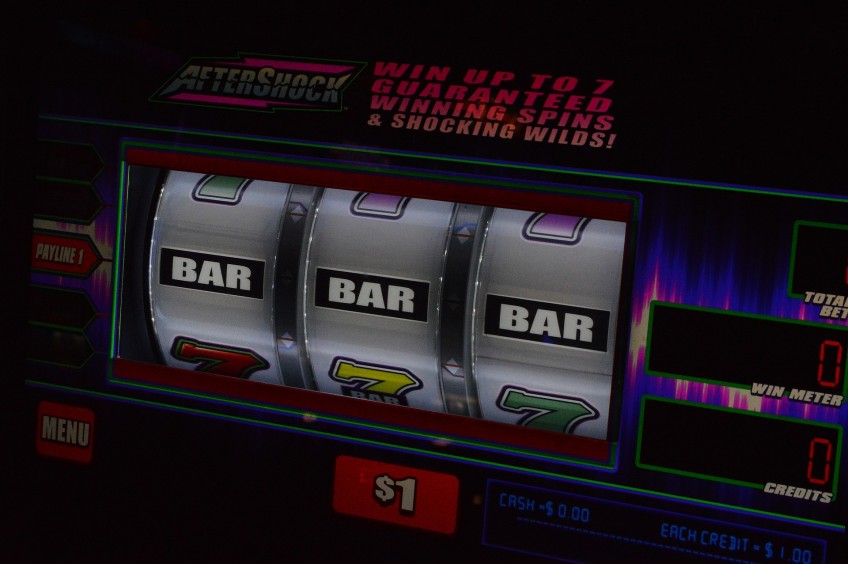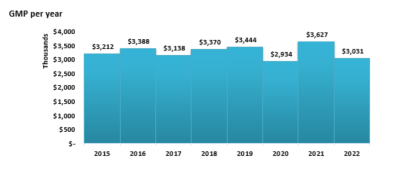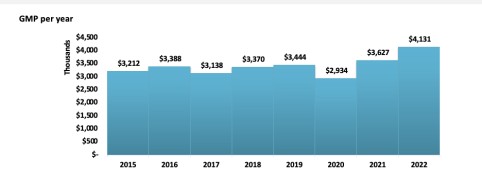
Council stuff-up misreports impact of pokies in district
In a report presented publicly last week, the Queenstown Lakes District Council claimed profits from pokies had fallen by 20 percent in 2022, however, government data shows the opposite – a 12 percent increase.
The report, signed off by finance and risk boss Stewart Burns, presented in relation to a required review of a gambling machine policy, says profit from gambling machines in the district for 2022 was $3,030,557.
"This is a decrease of 20 percent from the year 2021 when GMP (Gambling Machine Profit) was $3,626,640,” the report says.

Graph presented in QLDC's report on Class 4 Gambling Profit, incorrectly showing $3.03 annual profit.
However, the Department of Internal Affairs data shows gambling in the district reaching record highs post-Covid, hitting $4.13 million for the year of 2022.
It’s the highest recorded revenue by Class 4 Gambling Machines (pokies in clubs and pubs) in the DIA's recorded data, beginning in 2015. This is despite the closure of four pokies venues and 28 fewer machines in the district in that time.
Subsequently, the information, which was presented to Queenstown Lakes District councillors in a full meeting of the council last Thursday, misinformed elected members about the level of gambling in the district.
Andree Froud of the Problem Gambling Foundation New Zealand says Queenstown Lakes is following the national trend, with money put into the pokies rising across the country.
“We cannot explain why the spend is going up while machine numbers are going down except to say that when times are tough, people often spend more on gambling. This can be in the hope of a win or as escapism from whatever is going on in their lives.”

The correct graph by the Department of Internal Affairs, showing record high pokies profits in 2022.
Maria Bellringer, an Associate Professor for Auckland University of Technology’s Research Centre, says pokie machines are the most harmful form of gambling because of the rapidity of play and their accessibility - with around 40 to 60 percent of New Zealand's gambling machine profits coming from people experiencing gambling harm.
There are six pokies venues in the district - one in Queenstown, one in Frankton, one in Arrowtown, and three in Wānaka.
The report with the incorrect information was prepared by council staff as part of a required review of the district’s Class 4 Gambling and TAB Venue Policy.
In a press release received today from the council it's “aimed at limiting the opportunities and managing the effects of gambling in the district”.
However, Ms Froud says QLDC’s policy meets the minimum legislative requirements and should be tougher.
She advocates for a sinking lid policy – meaning no new venues for pokies can be opened in the district – which has been adopted by around half of New Zealand councils.
The idea of a sinking lid policy was floated at Thursday's council meeting at the same time the report was presented, but not adopted into the proposal by councillors.
“Although we believe even sinking lids don’t go far enough, it is the best policy available to reduce harm. The council’s current policy is the base legislative requirements and allows for more venues and pokies in the Queenstown community.
“This is of particular concern because Queenstown has a casino as well (pokies in casinos are not Class 4 gambling and are not covered under this policy).”
She’s also concerned there are no face-to-face counselling services in the Queenstown area for people impacted by gambling harm.
However, the only suggested changes adopted by councillors last Thursday to the gambling policy were the removal of public newspaper announcements for new pokies machines, no longer requiring gambling societies to provide data to the council (there's already a legislative requirement they provide data to the DIA), and requirement of a $500 application fee for societies applying to set up more machines in a partner venue in the district.
The Class 4 Gambling and TAB Venue Policy is under review and open to the community for consultation next Monday (April 3).
It should be reviewed every three years, and the last review was in 2017.
So, how did the council get its report so wrong? It appears there was a lack of fact-checking by QLDC staff who prepared the report.
The council report was completed on February 28, with data gathered from the DIA, and presented publicly on March 23.
A spokesperson from the DIA has confirmed how the mix-up could’ve occurred, saying their external gambling machine profit dataset was updated on March 1, to reflect the full 2022 calendar year.
“The council graph will only be showing up to the end of September 2022 (3rd quarter report), whereas the one online now, is the latest dataset with full 2022, hence the larger amount,” the DIA spokesperson says.
A QLDC spokesperson says “the information taken from the DIA website was correct at the time the report was drafted”.
“We will update any relevant material before consultation opens on April 3. All information that comes in during the consultation period, including the latest government data, will be considered by councillors when they make their final decision about any updates to the policy.”






























